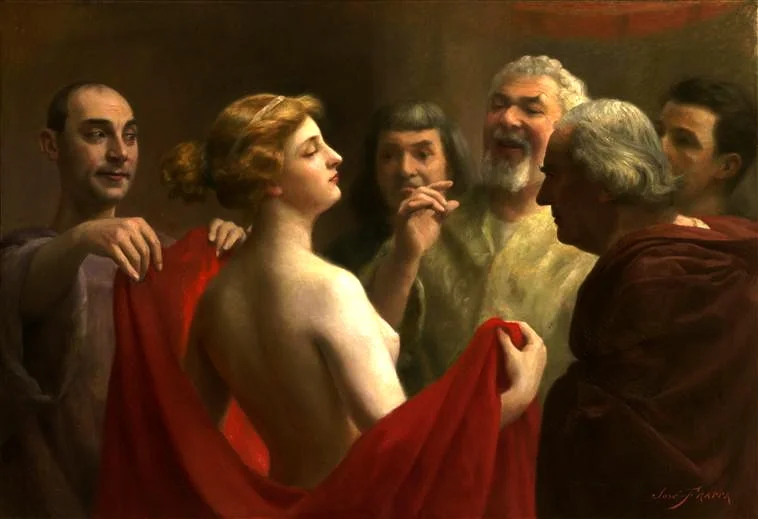Phyrne - did she really disrobe?
I am a really big fan of Kerry Greenwood's novels about Phryne Fisher, the 1920s Melbourne-based detective. A stunning goddess of a women, Phyrne is an independently wealthy, sexually alluring women who makes her own way in a world where women were very much seen and not much heard. Recently made into a tv series and now a feature film starring Essie Davis, the series has become very popular and not just for its opulent art deco settings. Davis plays a gutsy, sexy and highly intelligent Phryne.
But I have always wondered about the real Phyrne and whether the stories about her alleged disrobing in front of a bench of Greek judges was in fact true.
Phyrne was a nickname given to a Greek courtesan in the 4thc BCE. Credited with great beauty, she was said to be the model for a statue of Aphrodite. There are other statues dedicated to her as well as many paintings that detail her womanly attributes. As a wealthy woman, it is believed that she offered to rebuild the walls of Thebes after Alexander the Great destroyed them in 336BC. There was a condition though. On the walls was to be inscribed: "Destroyed by Alexander, rebuilt by Phyrne the courtesan" - nice touch!
If she did indeed finance the rebuilding of the walls of Thebes, how is she not remembered for this act? How is it she is remembered for getting her gear off? Surely rebuilding walls trumps a set of boobs?
Apparently, Phyrne was charged with impiety and it was at her trial that the infamous disrobing was said to have happened. Athenaeus writes in his account, The Deipnosophists:
"But Hypereides, when pleading Phryne's cause, as he did not succeed at all, but it was plain that the judges were about to condemn her, brought her forth into the middle of the court, and, tearing open her tunic and displaying her naked bosom, employed all the end of his speech, with the highest oratorical art, to excite the pity of her judges by the sight of her beauty, and inspired the judges with a superstitious fear, so that they were so moved by pity as not to be able to stand the idea of condemning to death "a prophetess and priestess of Aphrodite."
So, it appears that the disrobing was a last ditch effort for a verdict of innocent of all charges. Athenaeus was writing at least a century after the actual event, so by no means is this an eyewitness account. But time context is not the only issue with the version of events. He details another account of the trial written by Posiddipus:
"Phryne was once the most illustrious of us courtesans by far. And even though you are too young to remember that time, you must at least have heard of her trial. Although she was thought to have wrought too great injury to men's lives, she nevertheless captured the court when tried for her life, and, clasping the hands of the judges, one by one, she with the help of her tears saved her life at last."
What happened to the boobs? Not even a suggestion of disrobing here. Was it her tears that saved her life or her boobs? Why do such vastly different accounts exist?
It appears that the above versions of the story were adaptations of an earlier version written by Idomeneus of Lampsacus in the early 4thc BCE. The suggestion is that the above account of Phyrne's disrobing, written some time after her trial, could well have been written for comical purposes, not historical posterity. As we know, each telling of a story renders it slightly different from the previous. Each author has his or her own motives for telling the story and adds their own embellishments.... thus, the boobs. The salacious version of Phryne's courtroom saga could well have been a political comment about Greek lawmakers and leaders, rather than a comment about the desperate measures a women will go to in a court of law, or the power of a women's breasts! Graig Cooper (1995) makes several good points about the various versions of Phyrne's story in his article: Hyperides and the Trial of Phryne .
So, where does all of this leave us? For me, I take from this the fact that an independent women funded the rebuilding of the Theban walls after Alexander knocked them down. I learned that she was bought to trial and pleaded for her innocence and was granted freedom. I see that a series of stories were written by men, each of them adding their own personal flourish for their own political or social advancements. I also conclude that the extraordinary character in the Phryne Fisher Mysteries is an excellent account of the Greek women I like to think of as Phryne - making her way in a world where the law is made by men, judged by men and recorded by men.
"Destroyed by Alexander, rebuilt by Phyrne the courtesan."


